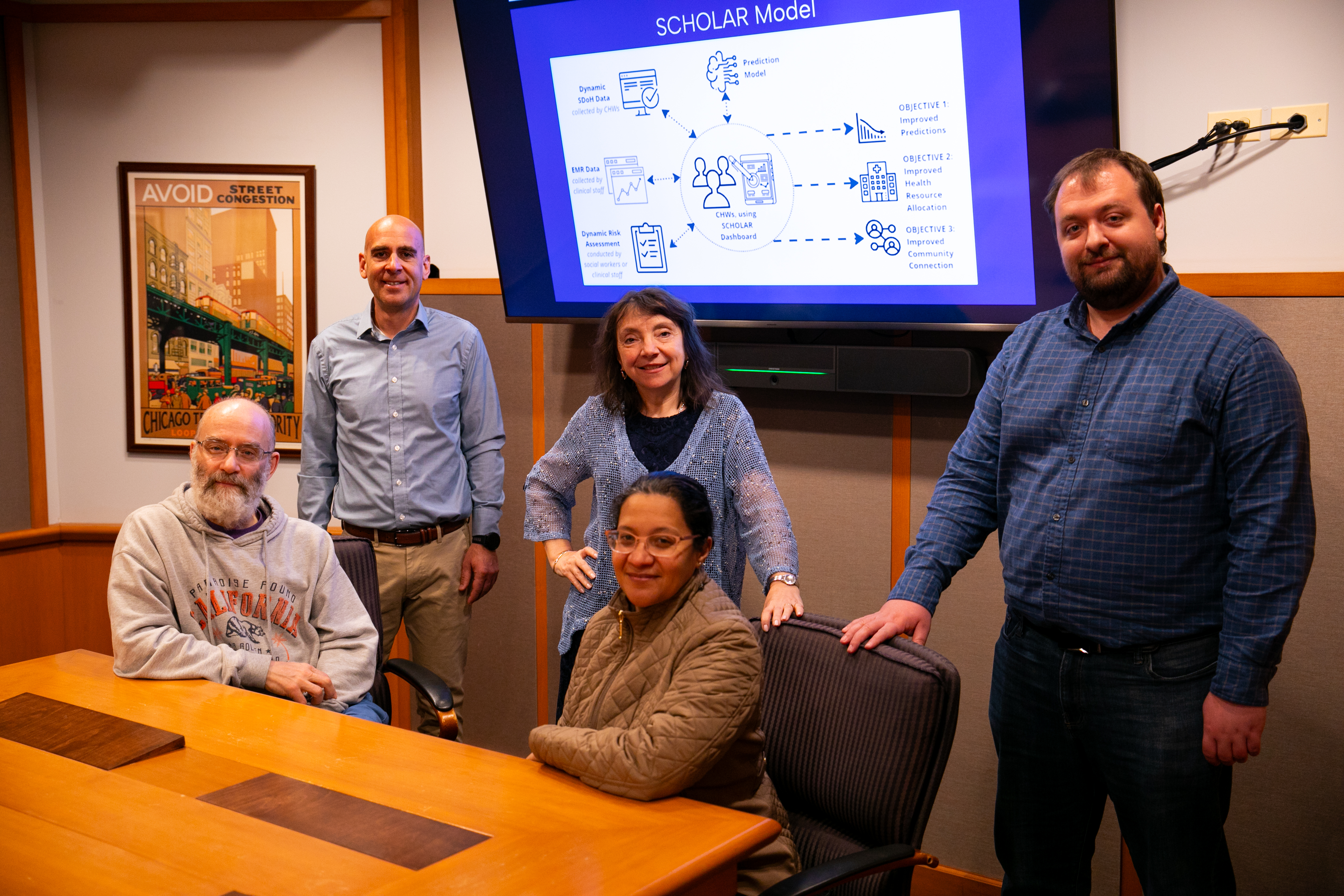 Pictured left to right: DePaul Researchers Jacob Furst, John Mazzeo, Daniela Stan-Raicu, Roselyne Tchoua and Alexandru Orhean. (Photo by Alex Soares/DePaul University)
Pictured left to right: DePaul Researchers Jacob Furst, John Mazzeo, Daniela Stan-Raicu, Roselyne Tchoua and Alexandru Orhean. (Photo by Alex Soares/DePaul University)
CHICAGO—Projects using artificial intelligence can often be perceived as automatically replacing human interaction with technology. Researchers at DePaul University and Sinai Chicago are challenging that assumption by partnering with community health workers to combine the predictive capabilities of AI with human insights.
The National Science Foundation has awarded researchers at DePaul and Sinai $1.5 million to expand their SCHOLAR model. This framework pairs community health workers with AI to identify high-risk patients and match them with appropriate support systems. The SCHOLAR approach aims to reduce re-admissions to hospital emergency departments, but it has applications to other areas as well.
“The responsible and ethical use of AI moving forward will depend on the integration of experts outside the technology domain,” said
Jacob Furst, a professor of visual computing at the Jarvis College of Computing and Digital Media and member of the research team. “The SCHOLAR model recognizes the important role of users in shaping AI for good.”
Personalized care from frontline workers
Community health workers are on the front lines, administering surveys and using their experience and intuition to identify what patients need. These care providers work closely with high-risk patients and have first-hand perspectives on which determinants of health matter, such as food and housing insecurity and transportation access.
“We’re drawing on these professionals and their experiences, asking community health workers what they feel are the most influential determinants in their encounters with patients. This allows us to prioritize and define those for the system,” said John Mazzeo, associate professor of health sciences in the College of Science and Health. “They can administer and advocate for better care, but they can also hone into these determinants that are most influential. That way, they’re having the greatest impact.”
When patients have a higher quality of care and are quickly and adequately assessed, they are far less likely to require emergency assistance. Fewer re-admissions also can lower costs for health systems like Sinai and improve their access to government grants. DePaul researchers are harnessing this data collection to give community health care workers better insights, faster.
“This important and innovative work highlights the crucial role that community health workers play in connecting with patients on a personal level," said Kelly McCabe, Director of Community Health Interventions & Research at Sinai Urban Health Institute. "The integrations of CHWs and their ability to build relationships with patients is an important feature in predicting readmission rates."
AI’s contribution to the quality of care
DePaul computer scientist
Roselyne Tchoua conducted an initial study of more than 1,300 patients at Chicago’s Sinai hospital system in 2023. In this pilot study, the AI model in conjunction with community health worker data predicted readmission rates with 5% more accuracy.
The NSF grant will assist DePaul researchers in expanding the scope of their research. “We’ll be able to expand our current work by adding more patient data,” said Daniela Stan-Raicu, associate provost for research at DePaul. “Our prototype model will become more accurate and can be applied to other communities with this expansion.”
"SUHI’s collaboration with DePaul’s data science team is very unique and holds much promise as we are faced with increasingly complex developments around AI," said Helen Margellos-Anast, President at Sinai Urban Health Institute. "We plan to continue exploring the human, community health-related aspect of data science work as we believe it benefits our communities and patients.”
The implementation of a user-friendly dashboard will streamline community health workers’ analysis and note-taking process. The ease of use will enable AI tools to reduce the time health workers are spending on assessments. Health workers’ contributions to the modeling process ensures that this dashboard will cater to their specific needs.
Use of models beyond healthcare
This interdisciplinary project not only includes DePaul faculty but involves both undergraduate and graduate students participating in system modeling, data input and interviews with health workers.
The contributions of DePaul researchers and community health workers at Sinai will benefit the Chicago community in the short term, but researchers have long-term aspirations. The model created through this program is easily applicable to other locations in the Sinai system and beyond.
“The models that we are building can be applied beyond the healthcare domain to other fields like education,” said Stan-Raicu. “Rather than identifying patients, social workers and other student support staff could modify the tool to identify students who may not graduate. The process of allocating the correct resources to identified individuals can be used in a multitude of ways.”
###
Media contact:
Julia Cremin